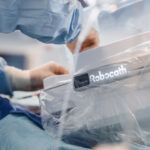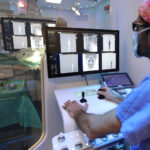Share this post:

Procedure took place simultaneously in Beijing and Urumqi, carried out entirely via 5G connection with R-One™ robotic platform
Rouen, France, December 13, 2023 – Robocath, a company that designs, develops and markets innovative robotic solutions for treating cardiovascular diseases, today announces it performed a First-in-Human robotic coronary angioplasty from 1,700 miles (2,800 km) away. Two interventional cardiologists, Prof. Yundai Chen in Beijing and Prof. Yining Yang in Urumqi, the capital of the Xinjiang Uygur Autonomous Region, performed the procedure. This world-first, performed entirely using a 5G connection, paves the way for more long-distance endovascular procedures in the future.
The cardiologists performed the procedure last July on a 59-year-old patient admitted to the People’s Hospital of Xinjiang Uygur Autonomous Region in Urumqi. Thanks to the R-One – Robocath’s first commercial robotic platform – Prof. Yundai Chen was able to perform a complete coronary angioplasty, assisted by Prof. Yining Yang and his medical team, who were on site with the patient in the catheterization laboratory. Technical and verbal communication between the two operators was maintained throughout the procedure thanks to the stability and reliability of the 5G network, eliminating possible latency effects in the imaging and sound system.
“I feel honored to have been part of this world-first-in-human procedure in the field of interventional medicine. Its success opens up the possibility of future long-distance cardiovascular treatment options. China currently has over 2,000 catheterization laboratories, but that’s still not enough to cover the whole country. With the help of robotics, we believe we can treat more patients faster and more effectively. Another advantage is that the robot can position the stent with exceptional accuracy. I’m excited to continue this partnership, which I believe marks the start of a new era for treatment in our field,” said Prof. Yundai Chen, interventional cardiologist in Beijing.
“This procedure shows the world the feasibility and safety of coronary angioplasty at very great distances, thanks to a perfectly stable and controlled communication system. The team at the People’s Hospital of Xinjiang Uygur Autonomous Region is extremely proud to have played a part in this phenomenal technological achievement, which has the potential to revolutionize interventional medicine,” added Prof. Yining Yang, interventional cardiologist at the People’s Hospital of Xinjiang Uygur Autonomous Region, in Urumqi.
“At Robocath, we are committed to developing smart connected robotic platforms that improve the treatment of cardiovascular diseases – the leading cause of death worldwide. Currently, these emergencies, including stroke, can remain untreated within a reasonable timeframe due to geographical remoteness and the small number of dedicated care centers. Robotic solutions remove these barriers entirely and ensure patients are treated quickly and to a very high standard by medical experts. From a specialist medical center, physicians will be able to perform operations on patients located in outlying emergency units. There are still several challenges to face before this type of treatment can be widely adopted, particularly in terms of organization and legal liability. However, we are convinced that the future of interventional medicine lies with robotics. Its remote connection module will considerably accelerate expansion, particularly in vast territories such as China,” stated Lucien Goffart, CEO at Robocath.
“This procedure marks the fulfillment of an ambition we set ourselves when we founded Robocath 15 years ago; to guarantee equal access to care for all, in all locations. I’m proud to see the success of this procedure – a world-first – which was made possible thanks to Cathbot, our joint-venture based in China. Robotic technology responds directly to the challenges faced by modern public healthcare systems and will enable the greatest possible number of patients to access the best treatment available. As with other breakthroughs, I am convinced that public authorities will rise to this technological challenge and initiate the necessary changes, given the major societal benefit that
long-distance robotic treatment of vascular emergencies represents today,” concluded Philippe Bencteux, president and founder of Robocath.
About Robocath
Founded in 2009 by Philippe Bencteux, MD, Robocath designs, develops and commercializes smart robotic solutions to treat cardiovascular diseases. As an active player in the digital evolution of the medical industry, its smart connected solutions aim to enhance hand gestures and make medical procedures safer.
Robocath develops robotic solutions which integrate a unique bionic technology that optimizes the safety of robotic-assisted coronary angioplasty. This medical procedure consists of revascularizing the cardiac muscle by inserting one or more implants (stents) into the arteries that supply it with blood. Every 30 seconds, somewhere in the world, this type of procedure is performed. Robocath’s robotic solutions are designed to operate with precision and perform accurate movements, creating better interventional conditions. Thanks to their open architecture, they are all compatible with market-leading devices and cathlabs.
In 2019 the company received the CE marking for R-One™, its first robotic solution. In a prospective, multicenter, non-randomized, single-arm clinical trial, R-One demonstrated safety and efficacy as it achieved more than 95% technical procedure success with no MACE (major adverse cardiovascular events). Currently R-One is used in Europe, Africa and China.
By pursuing the development of smart digital solutions, Robocath aims to become a world leader in vascular robotics. Based in Rouen, France, Robocath has more than 70 employees.
To download documents, you can right-click on the links above and chose « Save link as… »




